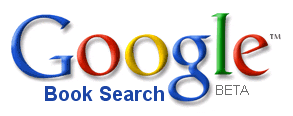
I’ve written about Google Book Search before, but it’s time to do so again – particularly after their PR barrage at the London Book Fair, some aspects of which I wrote up at the time.
For a while now, I’ve been broadly in favour of GBS, at least in as much as it’s forcing publishers to look seriously at digitisation strategies and becoming the driving force for change within the industry. Google’s PR drive has also stepped up a notch, with their flacks becoming increasingly informed about the book trade, a number of high-profile panels at book events, and a rapidly growing number of publishers coming on board. At the LBF, they convinced a fair number more.
So now, as is my wont, I’m the one getting nervous. This isn’t contrariness. I want digitisation to succeed, but I’ve got some worries about GBS, based on two main observations: Google Book Search isn’t the same as Google Web Search, and Google, if not actually, intentionally lying, is certainly wilfully misleading publishers about its intentions.
Google is going round telling everyone – and by everyone, I mean largely publishers, and publishers who don’t, by and large, have the firmest grip on the technological details of the enterprise – that Google Book Search is just like Google Web Search. It’s just an index. It’s about ‘discoverability’. It’s about total public access to knowledge, and Google is just the facilitator.
This is misleading. Google Web Search indexes pages already out there on the web. It stores a cached copy, but the actual data remains out there on the web, freely available to others, to read, or index for themselves. This isn’t the case with Google Book Search. Google holds all the data, and, unlike Google Maps, for example, I haven’t found any Open APIs or other means of getting at it. Yes, it’s copyright content; yes, Google has keyholder contracts with the rights holders; but the point remains: this isn’t open search, it’s a monopoly.
Of course, publishers have every right to give their data to competitors too (Microsoft’s catch-up and near-invisible Live Book Search, for example), and Google is the first to point this out, but it’s worth bearing in mind, particularly while there is still no open, agreed format for distributing books electronically.
This dilemma increases when you hear what Google are saying about the status of these files. Emphatically they state, and I’m directly quoting Google’s Jason Hanley (Strategic Partner Development Manager) here: “Google Book Search is not an ebook”. Except, to all practical purpose, it is, and it is intended to be.
As announced at the LBF, and probably elsewhere, Google intends to lauch its “online access” programme in the second quarter of this year. Google’s own support pages define online access as allowing “users [to] pay for immediate access right from their browser.” There are (or will be – again, I’m quoting from Jason Hanley’s LBF presentation here) two models for online access: a library model, which allows users to pay for unrestricted access to a book or a portion of a book for a limited period, and a shop model, which allows them to purchase unrestricted access to a portion or the whole of a book.
This is an ebook in all but name. Admittedly, it’s an ebook with the hardest DRM imaginable – you don’t own an actual copy of the book, you just pay to access it, a privilege which may be revoked at any time – but to the always-on, mobile user, it amounts to the same thing. And I have serious reservations about the way in which on the one hand Google is selling its services as a disinterested engine for discovery and real sales through linked bookstores, and on the other is on the verge of opening the largest and best indexed ebook store in existence.
Google has answers to all these questions, the main one being that publishers don’t have to use GBS at all – if they actually, physically, opt out of course. But who wants to actively exclude their content from the mighty Google?
I’ve said it before and I’ll say it again: I believe in digitisation and I think Google Book Search is an excellent tool for driving book sales and widening readership: great. But Google’s tricky use of terminology, their coupling of Web Search with Book Search, and the consequent, perceived obfuscation of their real intentions for and real treatment of the texts they are assimilating – particularly when talking to publishers whose own grasp of the technologies may be less than complete – has started to make me nervous.
UPDATE: Those interested in further discussion may well want to read the comments on a partial reprint of this article at TeleRead, as well as commenting here.
[…] BookTwo gets The Fear about Google Book Search […]
Pingback by Times emit » Blog Archive » Lots of Late Links (and holiday) — May 25, 2007 @ 2:44 pm